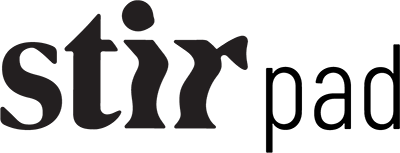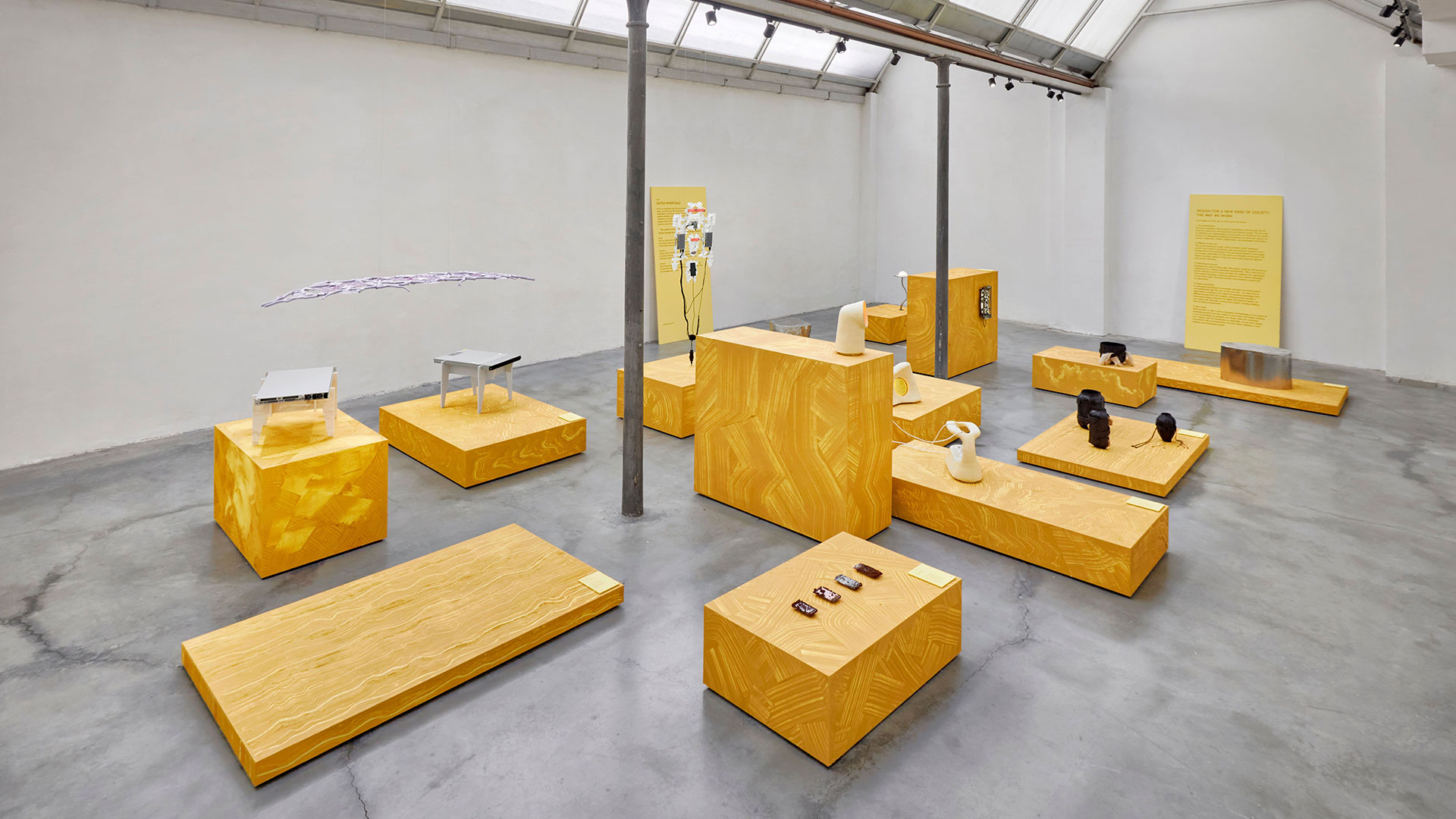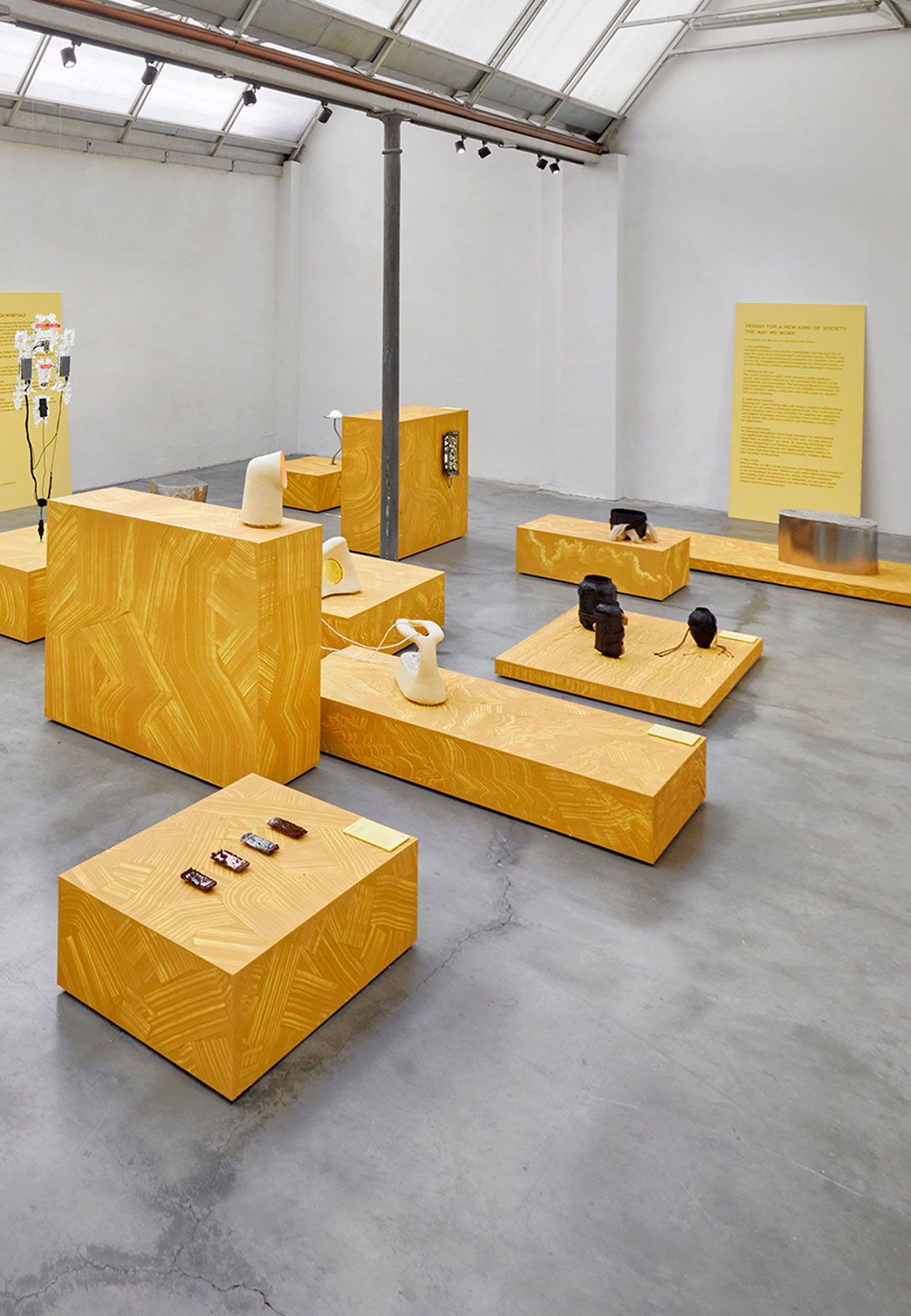At Salone del Mobile 2023, Dutch Invertuals presented Objects for a New Kind of Society: the way we work with a mission to collectively imagine more beautiful futures by creating visionary design projects. The result was a brand-new project dubbed 5TRACKS, where working and living coexist in a sizable urban development. The interiors of the atria of the two significant buildings were designed by Studio Dutch Invertuals, which created lively areas for gathering and working and put a focus on using sustainable materials to promote connectivity, creativity, and new rituals. The conceptions of eight designers that contributed to these spaces are presented in Objects for a New Kind of Society: the way we work which offers a fresh perspective on workplaces.
“We need to rethink our relationship with objects and our role as designers within our society,” shares Wendy Plomp, design director of Dutch Invertuals. While some designers reinvented commonplace items and rituals, others offered their viewpoints on the technologies that are progressively entering our workplace designs. Clémentine Buffa investigated the aesthetics of raw metal, Teresa Fernández-Pello explored the aesthetics of invisible data streams, and Barry Llewellyn's organic forms reflected the rhythm of the natural world. These artists asked one to reflect on our hyperconnected digital world by translating them into bright patterns. The exhibition also had the honour of inviting Her Majesty Queen Máxima as a part of her visit to meet Dutch designers at Salone del Mobile. She was given a tour by design director Wendy Plomp, who also discussed the value of design innovation and designers' contributions to urban development.
The aim of the exhibition stood on five pillars of the way humanity must work in the future. The first being, Post-individualism, an associated and inclusive society that does not need dominant paradigms that value individualism and hierarchy. To begin reconsidering our conception of community, we must first change the workplace culture. Traditional workspaces must be transformed into social settings that foster collaboration, community, and meaningful relationships. The second is Wellness at the core, the capacity of our surroundings and communities has been exceeded by the existing economic paradigm, which places a high priority on profit, unending expansion, and constant productivity. It promotes a fast-paced way of life that is no longer viable and has created an unhealthy environment. We must put well-being first and make room for both physical and mental well-being.
Rethinking resources is another crucial aspect as materials play an essential role in the development of sustainable surroundings as we explore new avenues for energy efficiency. The same is true for human resources like labour and time. We need to match more effectively with local circumstances and turn shortage into an opportunity by embracing new methodologies and material languages, taking inspiration from nature's principles. Hyper-connectivity is another aspect, where we must work to mould emerging technologies to our requirements as they permeate our settings more and more, and fundamentally change how we live and work. We need to develop tools that help us connect and bond, forming relationships with our immediate environs, by investigating technology from various angles and designing workspaces that prioritise a healthy balance between the digital and physical spheres. Lastly, New rituals, we have a sense of belonging and purpose at work. It helps us support ourselves but also connects us to others and helps us make sense of the world around us. We need to build stronger bonds with our surroundings and one another by implementing new rituals at work and making space for our spiritual growth, which will help promote a society that is more cohesive and harmonious. All these fundamental elements offer a holistic approach to working in the future, that can transform the narrative of work culture and build a more sustainable way of working.
For each exhibition, Dutch Invertuals commissioned a special campaign image from a designer, photographer, or artist. Digital artist Chris Kore produced the image for Objects for a New Kind of Society: The way we work Humanity where he has surrounded itself with objects from the physical world to make its existence more comfortable, secure, and superior. However, as a result of leaving and exchanging digital traces and information, humans appear to have turned into objects themselves since the development of digital technologies. These technologies can also be utilised to represent people digitally, enhancing their ability to participate in this new sort of society. They can improve our talents, but they can never take the place of what it really means to be a human.
STIR’s coverage of Milan Design Week 2023 showcases the best exhibitions, studios, designers, installations, brands, and special projects to look out for. Explore Euroluce 2023 and all the design districts—5Vie Art and Design, Brera Design District, Fuorisalone, Isola Design District, Tortona District, and Milano Design District—with us
Text by Ria Jha.






 Sign in with email
Sign in with email










What do you think?